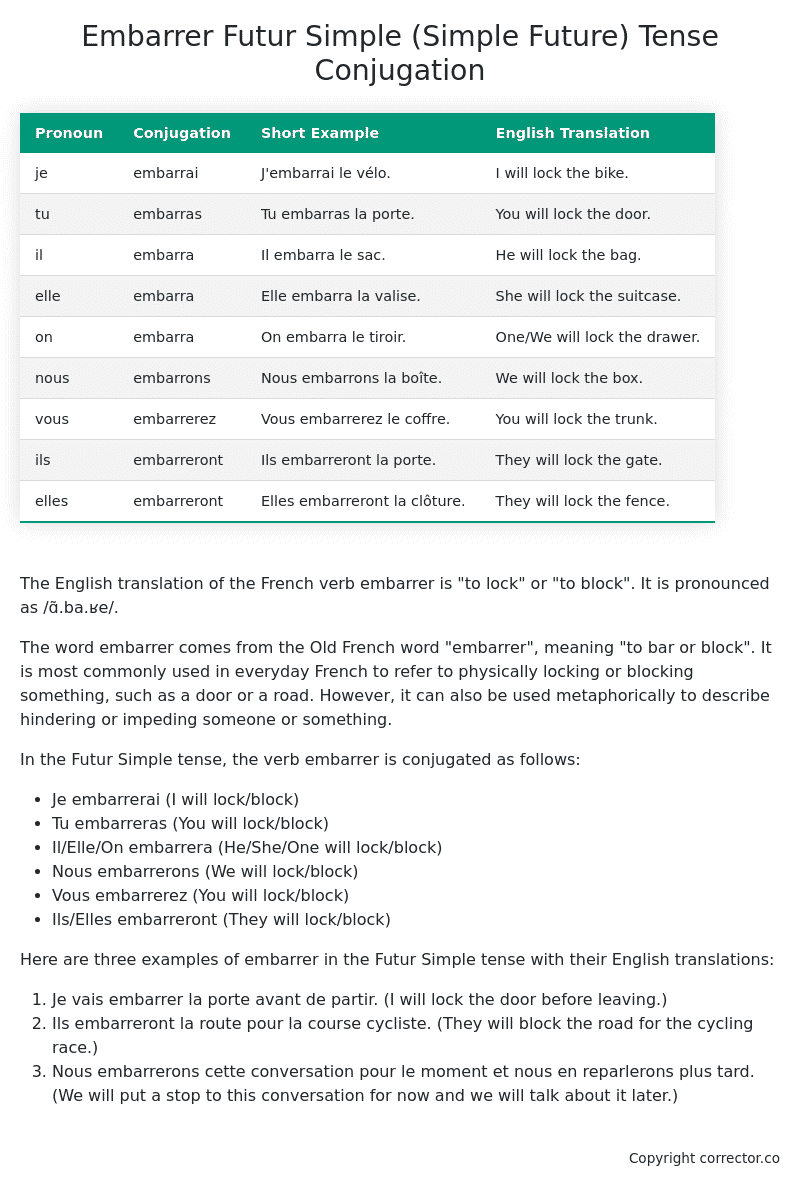Futur Simple (Simple Future) Tense Conjugation of the French Verb embarrer
Introduction to the verb embarrer
The English translation of the French verb embarrer is “to lock” or “to block”. It is pronounced as /ɑ̃.ba.ʁe/.
The word embarrer comes from the Old French word “embarrer”, meaning “to bar or block”. It is most commonly used in everyday French to refer to physically locking or blocking something, such as a door or a road. However, it can also be used metaphorically to describe hindering or impeding someone or something.
In the Futur Simple tense, the verb embarrer is conjugated as follows:
- Je embarrerai (I will lock/block)
- Tu embarreras (You will lock/block)
- Il/Elle/On embarrera (He/She/One will lock/block)
- Nous embarrerons (We will lock/block)
- Vous embarrerez (You will lock/block)
- Ils/Elles embarreront (They will lock/block)
Here are three examples of embarrer in the Futur Simple tense with their English translations:
- Je vais embarrer la porte avant de partir. (I will lock the door before leaving.)
- Ils embarreront la route pour la course cycliste. (They will block the road for the cycling race.)
- Nous embarrerons cette conversation pour le moment et nous en reparlerons plus tard. (We will put a stop to this conversation for now and we will talk about it later.)
Table of the Futur Simple (Simple Future) Tense Conjugation of embarrer
| Pronoun | Conjugation | Short Example | English Translation |
|---|---|---|---|
| je | embarrai | J’embarrai le vélo. | I will lock the bike. |
| tu | embarras | Tu embarras la porte. | You will lock the door. |
| il | embarra | Il embarra le sac. | He will lock the bag. |
| elle | embarra | Elle embarra la valise. | She will lock the suitcase. |
| on | embarra | On embarra le tiroir. | One/We will lock the drawer. |
| nous | embarrons | Nous embarrons la boîte. | We will lock the box. |
| vous | embarrerez | Vous embarrerez le coffre. | You will lock the trunk. |
| ils | embarreront | Ils embarreront la porte. | They will lock the gate. |
| elles | embarreront | Elles embarreront la clôture. | They will lock the fence. |
Other Conjugations for Embarrer.
Le Present (Present Tense) Conjugation of the French Verb embarrer
Imparfait (Imperfect) Tense Conjugation of the French Verb embarrer
Passé Simple (Simple Past) Tense Conjugation of the French Verb embarrer
Passé Composé (Present Perfect) Tense Conjugation of the French Verb embarrer
Futur Simple (Simple Future) Tense Conjugation of the French Verb embarrer (this article)
Futur Proche (Near Future) Tense Conjugation of the French Verb embarrer
Plus-que-parfait (Pluperfect) Tense Conjugation of the French Verb embarrer
Passé Antérieur (Past Anterior) Tense Conjugation of the French Verb embarrer
Futur Antérieur (Future Anterior) Tense Conjugation of the French Verb embarrer
Subjonctif Présent (Subjunctive Present) Tense Conjugation of the French Verb embarrer
Subjonctif Passé (Subjunctive Past) Tense Conjugation of the French Verb embarrer
Subjonctif Imparfait (Subjunctive Imperfect) Tense Conjugation of the French Verb embarrer
Subjonctif Plus-que-parfait (Subjunctive Pluperfect) Tense Conjugation of the French Verb embarrer
Conditionnel Présent (Conditional Present) Tense Conjugation of the French Verb embarrer
Conditionnel Passé (Conditional Past) Tense Conjugation of the French Verb embarrer
L’impératif Présent (Imperative Present) Tense Conjugation of the French Verb embarrer
L’infinitif Présent (Infinitive Present) Tense Conjugation of the French Verb embarrer
Struggling with French verbs or the language in general? Why not use our free French Grammar Checker – no registration required!
Get a FREE Download Study Sheet of this Conjugation 🔥
Simply right click the image below, click “save image” and get your free reference for the embarrer Futur Simple tense conjugation!

Embarrer – About the French Futur Simple (Simple Future) Tense
Formation of Futur Simple
For regular -er verbs (e.g., parler – to speak)
For regular -ir verbs (e.g., finir – to finish)
For regular -re verbs (e.g., vendre – to sell)
Common Everyday Usage Patterns
Conditional Statements
Interactions with Other Tenses
Futur Antérieur
Conditional
Present
Summary
I hope you enjoyed this article on the verb embarrer. Still in a learning mood? Check out another TOTALLY random French verb conjugation!


